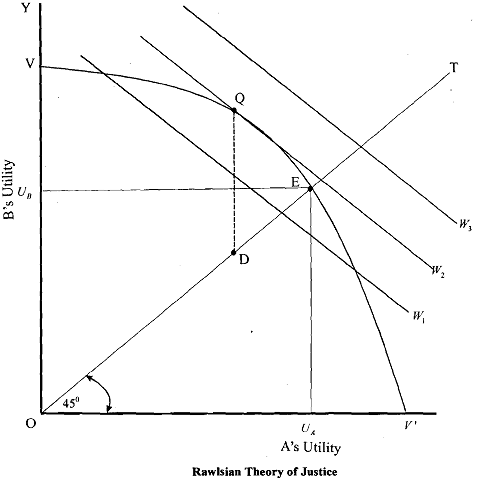Original Position:
Using a thought experiment Rawl's called "the original position" from which agents behind a "veil of ignorance" select principles of justice to govern the society. Two principles serve to organise society, are the "liberty principle" and the "difference principle." He rooted the original position in and extended the concept of "social contract" previously espoused by Hobbes, Rousseau and Locke, which made the principles of justice the object of the contract-binding members of society together.
According to Rawls, a society is a cooperative venture between free and equal persons for the purpose of mutual advantage. Cooperation among members makes life better because of the "primay goods" which include among others: health, rights, income and the social bases of self-respect. All social primary goods - liberty and opportunity, income and wealth, and the bases of self- respect - are to be distributed equally unless an unequal distribution of any or all of these goods is to the advantage of the least favored.
The problem every society must confront, Rawls noted, is that the members will often disagree on what constitutes the good and how the benefits and burdens within society will be distributed among its members. Some believe, for example, that the good consists in virtuous conduct while others believe that the good is discovered in the pursuit of individual happiness, at least in so far as the members of society define these terms. Some members believe that an individual's merit should determine how one would participate in society's benefits while others believe that society must provide the least advantaged extra assistance so that they will be able to share equally in society's benefits.
If society is to exist and to endure despite these and other such differences, its members must derive a consensus regarding what minimally constitutes the good. What consensus requires in actual practice is that the members agree upon the rules which will govern them as a society and that these rules will be applied consistently. But, Rawls asked, just how would a society and its members know what constitutes a "fair" principle? And, how would it be possible to determine what is "reasonable" for every member to agree with? Thompson cites the example of welfare to make this point: The growth of the welfare state has often been explained and defended as a progressive recognition that government should provide certain benefits (positive rights) in order to prevent certain harms to citizens (negative rights).
